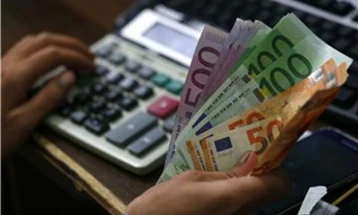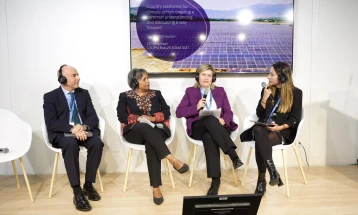EC: Macedonian economy to grow by 2.0% in 2023, 3.1% in 2024
- In its Spring 2023 Economic Forecast, the European Commission projects that the Macedonian economy will grow by 2 percent in 2023, and 3.1 percent in 2024.
- Post By Angel Dimoski
- 14:14, 15 May, 2023

Brussels, 15 May 2023 (MIA) – In its Spring 2023 Economic Forecast, the European Commission projects that the Macedonian economy will grow by 2 percent in 2023, and 3.1 percent in 2024.
The North Macedonia section of the EC’s Spring 2023 Economic Forecast says that following a partial recovery from the recession caused by the COVID-19 pandemic, annual GDP growth slowed from 3.9 percent in 2021 to 2.1 percent in 2022. The country’s economy was impacted by weakened external demand, disruptions in global supply chains and rise in global food and energy prices.
“While pensions and wages dropped in real terms, rising remittances supported disposable incomes and private consumption. Household spending, although less buoyant than in 2022, remains the key growth driver over the forecast horizon. Investment growth is projected to remain robust with some further build-up of inventories,” says the EC in its Forecast.
The negative contribution from the external side is expected to diminish over the forecast horizon, in line with increasing foreign demand and lower import growth.

The current account deficit rose markedly in 2022, on account of a sharp widening of the energy trade deficit that reflected the country’s high dependence on energy imports. A marked increase in private transfers (remittances) and in the services surplus, helped by a rebound in tourism, partly offset the deterioration in the energy trade balance. The projected narrowing of the current account deficit over the forecast horizon is mainly due to a significant improvement in the goods trade balance, due to lower commodity prices, as well as stronger external demand, supported by an easing of supply chain pressures.
Annual inflation rose to 14.2 percent on average in 2022, compared to 3.2 percent in 2021. Food and energy together account for almost 60 percent of the domestic consumer price index structure, and price increases in these two categories explain about three quarters of headline inflation, which peaked at 19.8 percent. While headline inflation dropped to 14.7 percent in March, core inflation persists, on lagged spillovers from energy and food prices to other components, but is expected to abate over the summer.
The economic growth is set to pick up in 2024, driven entirely by domestic demand. The fiscal deficit is projected to fall gradually, as well.
The EC points to the obstacles faced by the Government’s investment agenda and proposed tax reforms. On the other hand, the country’s ongoing EU accession negotiations acts as a catalyst to important structural reforms and fiscal sustainability.
Photo: Printscreen







